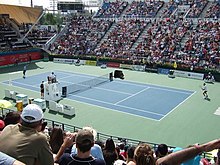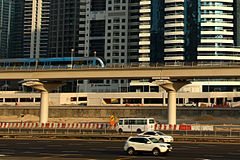Culture

The UAE culture mainly revolves around the religion of Islam and traditional Arab culture. The influence of Islamic and Arab culture on its architecture, music, attire, cuisine and lifestyle are very prominent as well. Five times every day, Muslims are called to prayer from the minarets of mosques which are scattered around the country. Since 2006, the weekend has been Friday-Saturday, as a compromise between Friday's holiness to Muslims and the Western weekend Saturday-Sunday.[195] Prior to 2006, the weekend was Thursday-Friday.
Geography

Dubai is situated on the Persian Gulf coast of the United Arab Emirates and is roughly at sea level (16 m or 52 ft above). The emirate of Dubai shares borders with Abu Dhabi in the south, Sharjah in the northeast, and the Sultanate of Oman in the southeast. Hatta, a minor exclave of the emirate, is surrounded on three sides by Oman and by the emirates of Ajman (in the west) and Ras Al Khaimah (in the north). The Persian Gulf borders the western coast of the emirate. Dubai is positioned at 25.2697°N 55.3095°E and covers an area of 1,588 sq mi (4,110 km2), which represents a significant expansion beyond its initial 1,500 sq mi (3,900 km2) designation due to land reclamation from the sea.[citation needed] Dubai lies directly within the Arabian Desert. However, the topography of Dubai is significantly different from that of the southern portion of the UAE in that much of Dubai's landscape is highlighted by sandy desert patterns, while gravel deserts dominate much of the southern region of the country.[53] The sand consists mostly of crushed shell and coral and is fine, clean and white. East of the city, the salt-crusted coastal plains, known as sabkha, give way to a north-south running line of dunes. Farther east, the dunes grow larger and are tinged red with iron oxide
Religion

Article 7 of the UAE's Provisional Constitution declares Islam the official state religion of the UAE. The government subsidises almost 95% of mosques and employs all Imams; approximately 5% of mosques are entirely private, and several large mosques have large private endowments. [109] All mosques in Dubai are managed by the Islamic Affairs and Charitable Activities Department also known as "Awqaf" under the Government of Dubai and all Imams are appointed by the Government.[110] Any person held preaching racism, religious hatred or promoting religious extremism is usually jailed and deported
Economy

One of the world's fastest growing economies,[115] Dubai's gross domestic product is projected at US$107.1 billion, with a growth rate of 6.1% in 2014.[116] Although a number of core elements of Dubai's trading infrastructure were built on the back of the oil industry,[117] revenues from oil and natural gas account for less than 5% of the emirate's revenues.[11] It is estimated that Dubai produces 50,000 to 70,000 barrels (7,900 to 11,100 m3) of oil a day[118] and substantial quantities of gas from offshore fields. The emirate's share in the UAE's total gas revenues is about 2%. Dubai's oil reserves have diminished significantly and are expected to be exhausted in 20 years. Real estate and construction (22.6%),[13] trade (16%), entrepôt (15%) and financial services (11%) are the largest contributors to Dubai's economy.[120] Dubai's non-oil foreign trade stood at $362 billion in 2014. Of the overall trade volumes, imports had the biggest share with a value of $230 billion while exports and re-exports to the emirate stood at $31 billion and $101 billion respectively.By 2014, China had emerged as Dubai's largest international trading partner, with a total of $47.7 billion in trade flows, up 29% from 2013. India was second among Dubai's key trading partners with a trade of $29.7 billion, followed by the United States at $22. 62 billion. The Kingdom of Saudi Arabia was Dubai's fourth trading partner globally and first in the GCC and Arab world with a total trade value of $14.2 billion. Trade with Germany in 2014 totalled $12.3, Switzerland and Japan both at $11.72 billion and UK trade totalled $10.9 billion
Sports

Football and cricket are the most popular sports in Dubai. Five teams (Al Wasl FC, Al-Ahli Dubai, Al Nasr SC, Al Shabab Al Arabi Club and Dubai Club) represent Dubai in UAE Pro-League.[207] Al-Wasl have the second-most number of championships in the UAE League, after Al Ain. Dubai also hosts both the annual Dubai Tennis Championships and The Legends Rock Dubai tennis tournaments, as well as the Dubai Desert Classic golf tournament and the Dubai World Championship, all of which attract sports stars from around the world. The Dubai World Cup, a thoroughbred horse race, is held annually at the Meydan Racecourse. Dubai also hosts the traditional rugby union tournament Dubai Sevens, part of the Sevens World Series Event pictures of Rugby 7 Dubai 2015. In 2009, Dubai hosted the 2009 Rugby World Cup Sevens. Auto racing is also a big sport in Dubai, the Dubai Autodrome is home to many auto racing events throughout the year. It also features a state-of-the-art indoor and outdoor Kartdrome, popular among racing enthusiasts and recreational riders.
Road

Five main routes – E 11 (Sheikh Zayed Road), E 311 (Sheikh Mohammed Bin Zayed Road), E 44 (Dubai-Hatta Highway), E 77 (Dubai-Al Habab Road) and E 66 (Oud Metha Road) – run through Dubai, connecting the city to other towns and emirates. Additionally, several important intra-city routes, such as D 89 (Al Maktoum Road/Airport Road), D 85 (Baniyas Road), D 75 (Sheikh Rashid Road), D 73 (Al Dhiyafa Road now named as 2 December street), D 94 (Jumeirah Road) and D 92 (Al Khaleej/Al Wasl Road) connect the various localities in the city. The eastern and western sections of the city are connected by Al Maktoum Bridge, Al Garhoud Bridge, Al Shindagha Tunnel, Business Bay Crossing and Floating Bridge The Public Bus Transport system in Dubai is run by the RTA. The bus system services 140 routes and trans ported over 109 million people in 2008. By the end of 2010, there will be 2,100 buses in service across the city.[175] In 2006 , the Transport authority announced the construction of 500 air-conditioned (A/C ) Passenger Bus Shelters, and planned for 1,000 more across the emirates in a move to encourage the use of public buses.[176] All taxi services are licensed by the RTA. Dubai licensed taxis are easily identifiable by their cream bodywork colour and varied roof colours identifying the operator. Dubai Taxi Corporation, a division of the RTA, is the largest operator and has taxis with red roofs. There are five private operators: Metro Taxis (orange roofs); Network Taxis (yellow roofs); Cars Taxis (blue roofs); Arabia Taxis (green roofs); and City Taxis (purple roof). In addition, Dubai Taxi Corporation has a Ladies Taxi service, with pink roofs, which caters exclusively for female passengers, using female drivers. The Dubai International Airport taxi concession is operated by Dubai Taxi Corporation. There are more than 3000 taxis operating within the emirate making an average of 192,000 trips every day, carrying about 385,000 persons. In 2009 taxi trips exceeded 70 million trips serving around 140.45 million passengers